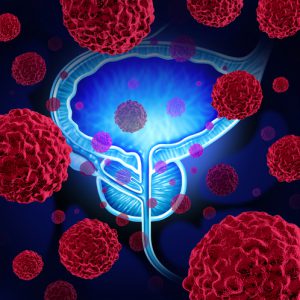Preventing and Treating Prostate Cancer

Early and Often
Prostate cancer, if caught early, is one of the most treatable cancers. Simple routine screenings are all that is required to determine if cell or tissue abnormalities merit further investigation. Beyond yearly trips to the doctor, physicians can use high-resolution MRI, computer tomography and bone scans to determine the nature of irregular cell growth and gauge how profoundly surrounding tissues or bones may be involved. These are minimally invasive tests which give a broad spectrum but minute-level evaluation of any areas which may be at risk. Men aged 50 or over, aged 40 or over and of African-American descent, or with a family history of prostate cancer should consider a yearly rectal examination and prostate-specific antigen (PSA) test, and discuss the risks and benefits of these procedures with their doctor.
Eat Smart!
It goes without saying that a healthy diet will aid in avoiding many cancer diagnoses. Specific to prostate cancer, medical experts suggest the following:
- Eat more fish! Aim for those with omega-3 fatty acids that are wild caught and not farm-raised.
- Don’t like fish? Try flaxseed or flaxseed oil which also possesses high levels of omega-3s.
- Avoid trans-fats like those in margarine. There is no healthy or acceptable level for these.
- Keep calcium intake at or below 1,500 mg (milligrams) per day.
- Limit red meat consumption and aim to get plant-based fats instead.
- Cook with olive oil rather than butter.
- Eat greens to keep the prostate clean. Broccoli, collard greens, cabbage, and kale are rich in nutrients ideal for supporting the prostate.
Watch and Weight
Keeping the body mass index (BMI) below 30 is crucial. Obesity is a significant risk factor for many cancers, prostate included. Those who lead sedentary lifestyles, or have jobs which require they spend much of their time seated, are at greater risk for prostate cancer. The Truth About Cancer Internet site provides examples of some of these occupations and activities, including: “bus drivers, truck drivers, motorcyclists, pilots, and men who have long daily commutes. Bicyclists also experience increased pressure to the groin when they ride and are also at an increased risk for prostatic complications.” Moderate exercises like walking, good food choices and reducing caloric intake are critical to maintaining an appropriate BMI.
Be Good to YOU
Perhaps prosaic, but still true, some basic principles of self-care can go a long way to bolstering prevention. It’s important to manage stress effectively. And those for whom stress is a problem significantly affecting life—seek assistance from friends, family, religious leaders or mental health professionals.
Sleep is also essential. Too much stress can profoundly impact circadian rhythm, and lack of sleep causes decreases in testosterone levels and elevated stress hormone production. Poor sleep also results in blood sugar imbalances and prostatic growth. Whereas good sleep habits keep these risk factors at bay. Too, deep-breathing stress-relief exercises are an easy way to calm the sympathetic nervous system, allowing for the reduction in stress hormones.
Get Real
It’s a fact that no man relishes prostate exams. However; simple tests can be life-saving. Yearly doctor’s exams allow for immediate detection of abnormal prostatic cell growth. And timely detection provides access to the myriad of minimally invasive and highly accurate tests giving men time and tools to prevent and prevail over prostate cancer.
NFCR Advances in the Field
The National Foundation for Cancer Research-supported scientist, Dr. James Basilion of Case Western Reserve University, is developing an innovation with advanced detection capabilities for prostate cancer. As demonstrated in animal studies, an agent which he and his colleagues have studied could greatly improve identification of cancerous cells by surgeons in real time during prostate cancer surgery—and do so in a manner without the radioactive risks innate to a competing method.
References:
http://mct.aacrjournals.org/content/13/11/2595.short
https://www.cancercenter.com/prostate-cancer/learning/
https://www.pcf.org/c/prevention/
https://thetruthaboutcancer.com/sitting-is-the-new-smoking/
https://thetruthaboutcancer.com/prostate-cancer-prevention/











